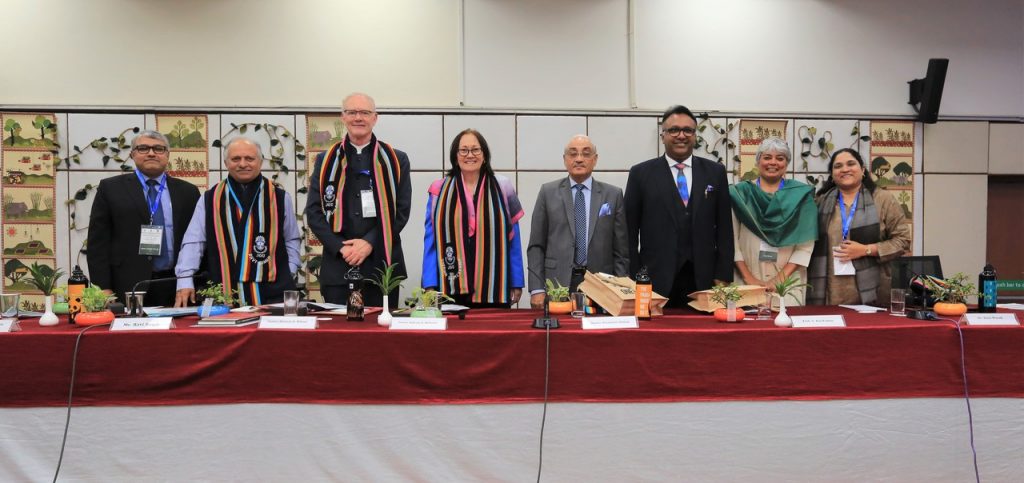
Mr. Justice Swatanter Kumar, Former Chairperson, National Green Tribunal emphasized the need for inexpensive and expeditious environmental justice to mitigate the effects of climate change. He also called for proper environmental impact assessments to address issues relating to climate change.

He was addressing a Conference on `Adapting Environmental Laws for Effective Climate Response’ that was organized by the O.P Jindal Global University (JGU) in association with WWF India in New Delhi recently.
Mr. Justice Kumar asserted that climate change is not an abstract concept but a direct consequence of human activity on earth. He expressed serious concern over receding of glaciers, deforestation, toxic waste arising out of ship-breaking and non-implementation of existing laws. Quoting Mahatma Gandhi, Justice Kumar emphasised that we need to hand over the Earth to the next generation in a better state of health. Drawing parallel between environment and time, he stressed the need for urgent action.
Referring to the enormous growth in the urban waste in Delhi from 400 to 600 metric tonnes in the late 90s to the present day 1700 metric tonnes per day, Justice Kumar observed that proper collection, segregation and treatment are required. He expressed serious concern over the fact that 40 per cent of this waste is not collected properly.
Justice Swantantra Kumar stressed the need for sensitization of judges, bureaucracy and social awareness at all levels. Referring to the increase in temperature on the agriculture sector in India on which over 70% of our population depends, he underscored the need for coordinated efforts. He also emphasised the need for alternate sources of energy.
The sessions graced by eminent Judges, environmentalists, academicians and students set the context and elaborated on the situation that needs to be changed on priority basis.
The Indian Judiciary has played a crucial role in interpreting the Article 21 of the Indian Constitution. The scope of Article 21 of the Constitution has been considerably expanded by the Indian Supreme Court, which has interpreted the right of life to mean the right to live a civilized life and it also includes the right to clean environment.
JGU Founding Vice Chancellor Prof (Dr) C Raj Kumar underlining the importance of law and its role in fighting climate change said “The theme of this conference is important for the future of human kind. In many ways we are facing an existential threat and this threat requires a collective response of humanity, and law as a social institution has always risen up to the occasion in the past. The hope is that understanding the need for addressing issues surrounding climate through law is a very important way by which we can build capacities to respond to huge crisis that is impending.”
Bringing in the global perspective, Justice Michael D. Wilson, Judge of Supreme Court of Hawaii, USA in his keynote address cited example of the climate refugees to explain how the issue of environment protection is still awaiting solution. “160 million Bangladeshis have become climate refugees and had to evacuate their own home-ground. Schools stay shut in Delhi in times of extreme pollution. Tigers face threats of deforestation and climate changes too. These are few examples of the situation. To change it, carbon neutrality, energy conservation and environment protection need to be mandated.” He said.
Justice Sabrina McKenna, Judges of Supreme Court of Hawaii, USA too bought up case studies to explain the alarming scenario. But she sounds hopeful saying, “Green tribunal has been a milestone in environmental justice. People can now sue for a clean and happy environment. When people are aware, active and act together and laws are there too, combating climate changes will be easier.”

In her introductory remarks Ms Moulika Arabhi, Advisor, Centre for Environmental Law, WWF India said, “Law and policies of the country need to be stringent to combat climate change and its adverse effects. Economic development, decentralized Government mechanisms and judiciary collaboration need to go hand in hand to deal with climate change issues and adaptation to them through policies implementation. Environment law courses and conferences like this provide the necessary understanding.”

Dr. Sejal Worah, Programme Director, WWF-India pointed out how India is becoming worse hit by the unusual climatic disorders and the consequent impact on GDP. “We can see how the climate is changing every day and if this continues, it will have a huge impact on biodiversity. We thus, need to secure our future and that of the coming generations. Moreover, this scenario is leading to higher costs incurred to adapt to the sudden changes. Who is going to pay for them?”
Through-out the day, there were thematic sessions discussing legal and policy measures to promote energy efficiency and renewable resources and the methods to strengthen adaptation and resilience to climate change. Experts deliberated on climate change, environment damage and a host of other issues plaguing our planet, and ways to counter these disastrous effects.
The daylong conference culminated with the launch of the Masters Programme in Environmental Law, Energy and Climate Change, a first of its kind to be taught in India by Jindal Global University, in association with WWF-India.
The two premier institutions have come together to launch a one year LLM programme in a niche and futuristic area relating to environmental justice and climate change, which are critical to our existence on the planet. A Memorandum of Understanding (MoU) to this effect was signed between the two institutions in New Delhi on 27th March.
